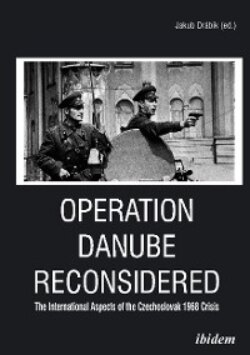Читать книгу Operation Danube Reconsidered - Группа авторов - Страница 5
01
Introduction
ОглавлениеAt 11 o’clock in the evening of 20th August 1968, after the signal “Vltava,” the armies of four Warsaw Pact countries, the Soviet Union, Poland, Bulgaria and Hungary, crossed the borders of Czechoslovakia. While Romania and Albania refused to participate, East German forces, except for a small number of specialists, did not participate in the invasion because they were ordered from Moscow not to do so. By August 25th, there were 27 invasion divisions in full combat status in Czechoslovakia, over 6000 tanks, and almost 1000 military aircrafts. Over a hundred Czechoslovakian civilians were killed and approximately 500 seriously wounded during the occupation. The invasion successfully stopped Alexander Dubček’s Prague Spring liberalisation reforms and strengthened the authority of the authoritarian wing within the Communist Party of Czechoslovakia (KSČ). Literally overnight the Czechoslovak experiment was transformed from living reality into history.
Apart from distressing domestic reforms, especially the decentralization of administrative authority, the more important reason for the Soviet-led Warsaw pact intervention were the signs of a shift in Czech foreign policy that Soviets feared might weaken the position of the Bloc in the Cold War. In regards to foreign policy, the “new course” of Czechoslovakia foresaw wider cooperation with the world, especially with West Germany. Czechoslovakia also sought to loosen its bonds with Warsaw Pact and Comecon, the organization established to facilitate and coordinate the economic development of the Soviet bloc, and gradually showed less and less enthusiasm for the Soviet assistance to the third world countries in a bid to establish its influence there. There was a fear in Moscow that all this could eventually mean that Czechoslovakia might drift away from the communist bloc towards neutrality. This might be followed by Hungary and Poland, slowly undermining the Soviet position in Germany and possibly even losing its buffer zone in Europe.
A decisive faction of the Soviet leadership felt that what was at stake was nothing less than the power balance in Europe—and by extension, potentially the world. That faction saw no other option than a military intervention. Leonid Brezhnev, who did not regard the choice of Alexander Dubček as the successor of Antonín Novotný as problematic in the beginning was subsequently very disappointed. With every liberalizing step in Prague, Moscow grew ever more uneasy. By July 1968, Moscow had come to the conclusion that events in Prague were spinning out of the Party’s control and something has to be done. However, Brezhnev feared his rivals in the Soviet elite, who could use against him any weakening of the Communist power in Czechoslovakia, more than the inevitable international outrage that would be caused by the occupation. After hesitations which lasted some months, he made a choice in favour of the occupation.
Although the Soviet Union’s action successfully halted the pace of reform in Czechoslovakia, it had unintended consequences for both the unity of the Communist bloc and establishing the new Soviet foreign doctrine. The invasion helped established a so-called Brezhnev Doctrine, that—based on the assumption that a challenge to Socialist rule in one part of the Soviet bloc was a threat to the whole enterprise—justified Moscow’s intervention in any country where it felt Communist rule was under threat.
The Warsaw pact intervention, however, did not spark an important international crisis. The division of Europe between superpowers was confirmed and a new version of east-west “détente,” based on that understanding, could be launched. Given the exhausting American involvement in the Vietnam War, the Soviets assumed (correctly) that the United States would not intervene and would make do with the condemnation of the invasion. Lyndon B. Johnson cancelled a planned summit meeting with Brezhnev, but this was something that Soviets expected and they concluded that maintaining the control over the Eastern Bloc was more important. Thus, the invasion was completed without any direct intervention from the West or NATO. Similarly, attempts in the United Nations to pass a resolution that would condemn Warsaw pact action were vetoed by the USSR and slowly died away.
This book focuses attention on the international context of the 1968 crisis in Czechoslovakia. Its chief aim has been to bring together experts from within as well without Central Europe and to ignite or—perhaps, better—to re-ignite an international discussion about the Prague spring, its origins, its unfolding, its aftermath and—most importantly—its international context. The debate and historiography regarding the Prague spring is exhaustive, but in a way fragmented, and—besides a few exceptions—with each national historiography giving its soliloquy. Thus, it was high time to start an international dialogue and to investigate and analyse the reactions of the key international players and Warsaw pact member states involved in the invasion, to bring to the debate the newest findings of the respective national historiographies.
Jakub Drábik
